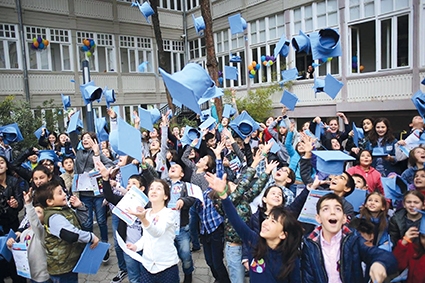KinderUni, Goethe Institute Launches New Educational Platform for Children
Goethe Institute Georgia has launched an online educational platform: a university for children aged 8 to 12, as part of Georgian-German Year (2017).
KinderUni is completely free for children, parents and teachers, who can register online, and offers various thematic lectures encompassing three faculties: humans, nature and technology. Each faculty has different video-lectures with entertaining tasks to be done, uniting 45 video lectures and over 360 interactive assignments. The video content for the lectures of the online children’s university launched by Goethe Institute in Tbilisi, is taken from an award-winning children’s TV program in Germany called “Sendung mit der Maus” (a program with a mouse) where Christoph Biemann, the program host, together with the fictional character, online university professor Einstein and his assistant Sophie Schlau, discuss various topics that are interesting for young children.
The lectures at KinderUni are available in Georgian and German, and while the format and concept of the university for children is said to be extremely popular in Germany, it is relatively new for Georgia.
“The idea for a children’s university comes from Germany, where children are able to attend seminars and lectures within universities but the online university was initiated by Goethe Institute in Moscow first,” Keti Tibua, Education Projects Coordinator at Goethe Institute Georgia, told GEORGIA TODAY.
“As there aren’t enough university cities in Georgia where we could invite children for lectures or seminars on site, we decided to make an online university for our children too, adapting and translating the content into Georgian for them. Internet and computers are more or less available for everyone and we wanted to serve children not only in the big cities in Georgia, but also in the regions. Since KinderUni is designed for children aged 8 to 12, it would be rather difficult for them to come to Tbilisi for lectures, and the KinderUni online concept makes it accessible from everywhere, no matter where you live,” she said of the advantages of the project, which was officially launched in October 2017 in Georgia.
“KinderUni is based on the integrated learning of both the subject and the language, which resonates with the latest tendencies of language-learning methodologies today, and the faculties at KinderUni are designed around popular subjects, from humans to technology and nature. After registering online, children can choose with which faculty to start, and after a video lecture they are given an assignment, the successful completion of which sees medals awarded and the chance for them to move to the second lecture, with tasks becoming more difficult,” said Ana Mshvildadze, Educational Projects Coordinator. As Ana notes, the process of learning is entertaining and is based on the university principle: with children earning different titles, passing different stages as they learn, starting as students and moving up to Bachelor’s, Master’s, and Doctor’s degrees.
“In order to attend KinderUni online university, a child does not necessarily need to know German; however, from time to time during the video lectures there are German words that students have to learn in order to easily proceed to the next level, so students are able to learn language basics: it’s not difficult, and it’s all built on entertainment,” Zurab Bolkvadze, Head of the Library and Information Department told us.
“The goal of KinderUni is to give children a chance to learn subjects in an entertaining way, those that for some reason might seem boring for them at school,” Ana continued. “All of the lectures are based on questions, for example, why do we hear the sound of the sea in a sea shell: questions that interest children and are often difficult for parents to explain, plus there are many ideas at KinderUni that can be an inspiration for school projects.”
As Keti Tibua told us during our meeting at the Goethe Institute Tbilisi office, seminars for school teachers were organized to explain how they could use the online university materials as additional content during German language or Physics lessons at schools. So far, a school from Batumi and another in Zugdidi are actively engaged, and according to Keti, they’re hoping to receive more positive feedback and to get more schools involved in future.
In addition, in the framework of the KinderUni project, a competition entitled “1000 questions” was organized, inviting children to send in several questions they were most interested in, the 10 winners for the most creative questions to be announced and awarded later.
“KinderUni has children, parents and teachers as its target audience. For teachers, it’s a great resource for new projects, new ideas that they could incorporate into their teaching. Of course, it’s totally up to them to use this approach and to make learning process more interesting for children as an experience,” Ana stressed.
“We have noticed that learning online and via computer is challenging and something strange for students and children in Georgia. The culture of autonomous learning has yet to be developed. We are more accustomed to the traditional, conservative environment where a teacher or a tutor is needed to explain and teach us. The KinderUni as a project also aims to teach children to get that skill of learning independently. In a way, it is a challenge for the education system not only in Georgia, but globally,” Ana said.
“We hope that KinderUni will change that approach, and we’re already receiving more and more positive feedback from children,” Zurab Bolkvadze said.
Nino Gugunishvili












